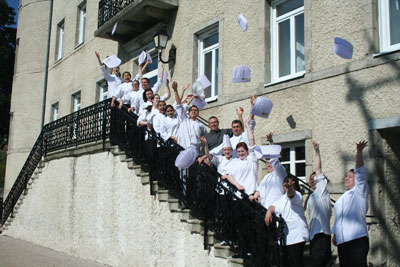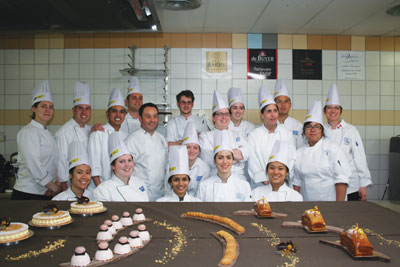
Euro trip, George Brown-style
August 18, 2011
By Laura Aiken and Christophe Measson
One teacher, 16 students and two weeks immersed in the village life of
France. Sounds like a culinary adventure of a lifetime for those
aspiring bakers at George Brown College who accompanied their
instructor, Christophe Measson, to Lyon, France, from May 2 to 14.
One teacher, 16 students and two weeks immersed in the village life of France. Sounds like a culinary adventure of a lifetime for those aspiring bakers at George Brown College who accompanied their instructor, Christophe Measson, to Lyon, France, from May 2 to 14. Over two weeks, they discovered local restaurants, markets, wineries, butchers and cheese makers. They also participated in workshops at the Yssingeaux Pastry school and Culinary school Le Renouveau. Read on for a roundup of student insights into the life of food and the baker in France.
 |
|
| George Brown students whooping it up on a special class trip to France.
|
How vital are farmer’s markets, local butchers, cheese farms, etc., to a French chef?
“I got the impression that food is not taken lightly in France. It is a very serious and important job to be a chef, and the fresh produce is only one step in ending up with the best product. We were lucky enough to visit sausage makers and a goat cheese farm . . . . We toured the curing rooms for these sausages, and they are handmade, each day, and cured. The goat cheese farm was owned and operated by a family. From milking the goats to making the cheese, the process was done with such care. It was lovely to see what work goes into the amazing foods we enjoyed in France.” – Cynthia Shao
“I feel as if all of these are essential to a French chef because it seems very difficult to actually have different suppliers coming to such small towns. Unlike Canada, where we have the benefit of having suppliers from all around deliver everything straight to us, French chefs are very dependent on their local markets, butchers, etc. It almost seems as if in Canada, the suppliers come to us, but in France, [chefs] go to them. Also, supermarkets aren’t readily available in France like they are here and therefore their food tends to be fresher because the food is cooked right away.” – Mark Camu
What are the most fascinating things you learned at the pastry class at Yssingeaux?
“For starters, how to make double-colour macarons. It’s incredible to see how easy it is to create new and innovative pastries. Just a slight tweak creates something completely different. It’s like an artist using a paint brush versus their fingers or pastel versus water colour. The second thing I’d say was most fascinating was how different their finishing/plating style was. Very simple. Ours, in North America, keeps getting more elegant and elaborate. Theirs is more like abstract art. Lots of shapes and lots of thinking outside the box – like when cutting circles out of chocolate, use the cut-out instead of the circles. Absolutely brilliant.” – Adam Vogler
“How they tend to take their time and cook everything very slowly. How to do a two-coloured macaron. That although the taste and look of the product is important, the way it is presented also makes a really big difference to the overall appeal.” – Mark Camu
What similarities can be drawn between French and Canadian cuisine? What differences?
“The major difference I find between French and Canadian cuisine lies in simply how they approach food in their lives. Being from North America and living such a fast-paced lifestyle, we rarely have time to enjoy our food and really dine. The French make this a huge part of their lives, and meals can take anywhere up to four hours. They have a very specific structure to their dining experience. It will begin with aperitifs, followed by a light appetizer, then mains, then cheese . . . followed by dessert and coffee. Dining for them is very social and relaxing.” – Stephanie Duong
 |
|
| Proud students at their workshop on entremets taught by M.O.F. Bruno Montcoudiol at Yssingeaux Pastry School.
|
“I found that there is little to no spiciness in French cuisine. Even the mustard had no kick to it. In French food, it was the ingredients in the meal that were the stars. Most of the food was simply prepared, and the fresher the food, the better the meal. I loved that we had Le Puy lentils in many of our meals, which showcased the local and very delicious lentils made many different ways, but always showcasing the taste of them.” – Cynthia Shao
“The differences that I noticed between French and Canadian cuisine were that each small town had their own specialty. In one town we ate a lot of duck in another we ate a lot of pork. When we visited Regis Marcon’s restaurant, that town was known for their mushroom and that was predominantly shown in his menu. They had fewer fried food restaurants then we did. Their meals tend to last at least three courses, one of which is always cheese. Their breakfast is lighter compared to ours. They tend to have croissants and a piece of bread whereas we have eggs, bacon, sausage and pancakes. The similarities between the two cuisines are that they both don’t serve a lot of vegetables and fruits. It would have been nice to eat more of those when travelling.” – Margret Tran Le
“One of the biggest differences I found was in the pastries. They put so much time and effort into their desserts. They make them taste like you’re enjoying it for your first time, every time, and make you feel like the only thing you want to do is salivate for another. The colours, aromas and ingredients alone will give you an indescribable high that can last until your next visit to that very same patisserie. The bakeries carry your nose in on the scent of their fresh baked breads and the whole thing is just unbelievable to see, smell and taste.” – Adam Vogler
What do you feel that your experience in France contributed to your development as a chef?
“As a chef, it’s always important to keep moving, keep learning. The best way I feel, to learn about a culture, and to immerse yourself in a culture, is to experience the culture through its food . . . from the way they approach their cuisine, to the ingredients used, to the overall eating experience of that culture. I think that the quality of ingredients in France, from their butter to their eggs, is much different than the quality we find in Canada. And the French accept nothing but the best for their pastries . . . something that I find sometimes is forgotten in North America. I feel that after witnessing and experiencing the level of perfection that the French strive for in their food, I want to make that my own standard when I go into industry, wherever I am.” – Stephanie Duong
“To see how committed and focused the chefs were on making their food the best was truly inspiring. It was a mind-opening experience, seeing that success doesn’t necessarily mean having to be on television to get publicity. Even after achieving three Michelin stars at his restaurant, Regis Marcon was still happy and willing to show 16 students his kitchen and hotel, and allow us to scavenge his field for wild flowers and herbs.” – Cynthia Shao
“It had showed me flavour combinations that I wouldn’t even think of. Using wild herbs and wild fruits can make such a difference in your food. This trip overall was an eye opener for me. It made me more motivated and determined to work hard and travel more . . . . This trip taught me that it’s not always good to rush, sometimes it’s better to slow down and enjoy what you’re doing.” – Margret Tran Le
“Going on this very special trip to France has inspired me to continue to learn – about pastry and about wine. I want to travel, and visit other countries to see how their pastries differ from the French. As a chef, I want to grow. I want to experience as much as I can and learn as much as I can and be the best that I can be to ensure that my love and my passion for food and pastry gets carried on to other people.” – Adam Vogler
“France has definitely opened my eyes to how different foods are around the world. Both in preparation and in the final product, there is a noticeable difference between the two cultures. They are so dedicated to their profession, and the amount of detail that is put into their pastries is amazing. Seeing all the different markets and the freshness of their food, I have also gained a new respect for ingredients. The trip was a once-in-a-lifetime experience and has made me push myself to become a better pastry chef.” – Mark Camu
*Answers have been condensed and edited
Print this page
Leave a Reply